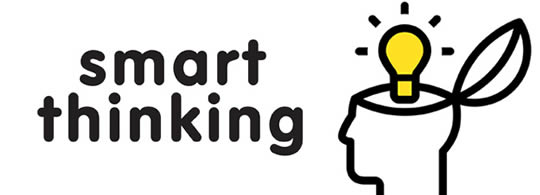Get Smart: A Guide to Better Thinking

Book Review: Smart Thinking: Three Essential Keys to Solve Problems, Innovate, and Get Things Done by Art Markman
Ready to sharpen your thinking and problem-solving skills? Art Markman provides some useful advice in Smart Thinking. Unlike some books in the genre, this book backs up its advice with solid research. Markman is a leading cognitive scientist at the University of Texas in Austin, and he takes a measured, fact-based approach to compiling his list of advice.
High Quality Knowledge
One concept that Markman says is critical to effective thinking and problem solving is high quality knowledge. Often, problem solving is less about a flash of intuitive brilliance and more about the application of knowledge, often from a seemingly unrelated field. James Dyson invented his highly profitable vacuum cleaner by combining his knowledge of a problem (vacuum cleaner bags sometimes leak, and restrict suction as they become plugged with dust) with the knowledge that factories sometimes collected dust by spinning air in large cyclones. Markman cites similar examples, and notes that redefining the problem is often the key to the solution. By defining the purpose of the vacuum cleaner as separating dust from air without requiring paper or cloth filters, Dyson was able to visualize a novel solution.
The book is organized into eight chapters representing its major topics:
- What Is Smart Thinking?
- Creating Smart Habits and Changing Behavior
- Promoting Quality Learning by Knowing Your Limits
- Understanding How Things Work
- Making Comparisons and Applying Your Knowledge
- Maximizing Memory Effectiveness
- Smart Thinking in Practice
- Creating a Culture of Smart
Remember This!
In the Memory chapter, Markman reviews how our memories work. His text strikes a nice balance between being overly simplistic on one hand and neuroscience jargon on the other. Quickly, though, he gets into practical strategies for improving memory. Need to learn something? Learn it in the environment in which you’ll have to remember it. Markman cites research showing that scuba divers who memorized words either on land or underwater remembered more words when they were in the environment where the learning took place.
Desirable Difficulty?
One of the more interesting bits of research cited by Markman shows that memory is improved when learning is a little more difficult. Hard work while learning is frustrating, but the memories are more lasting. So, a professor that makes the students work for the knowledge a little may be more effective than one who lays out the material in a crystal clear, highly engaging manner. Hence, professors highly rated by students for their teaching skills, may, in fact, be less effective in promoting learning. (I can see the prof telling the dean something like, “Of course my students rate me as a poor teacher; you want them to learn, don’t you?”)
There are many good prescriptions in Smart Thinking to help sharpen all kinds of cognitive skills, and all are backed up by sound science. In the final chapter, Markman brings these skills together in a way that the reader can form useful habits for better thinking and problem solving.
I like Smart Thinking a lot, and hope I have the discipline and time to work on actually implementing some of Markman’s ideas. I fear, though, that this book could be a lot like diet and exercise books – the science may be solid and the programs effective, but few readers will make that information part of their daily lives for long enough to make a difference. Still, there’s hope. Markman gives the reader excellent advice in a readable and actionable way, and if even some of the knowledge sticks, we’ll see people and businesses coming up with better strategies and brighter ideas.
Group Intelligence?
One interesting way of using the book would be for several individuals to form a finite-term “smart thinking” club that would be a sort of single-title book club devoted to understanding and using the content of Markman’s book. Exercise programs and diet plans work better when there is group motivation involved, and I’d bet that the same peer dynamic would boost efforts to sharpen cognitive skills. A group of co-workers would be ideal from a logistics standpoint (what company wouldn’t like smarter staff?), but a group could even meet virtually. If anyone tries this, let me know how it works out!
Amazon Link: Smart Thinking: Three Essential Keys to Solve Problems, Innovate, and Get Things Done
Kindle Version: Smart Thinking: Three Essential Keys to Solve Problems, Innovate, and Get Things Done
